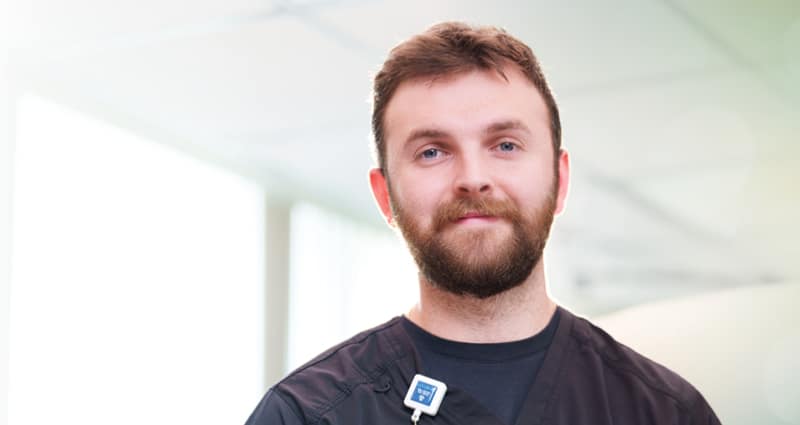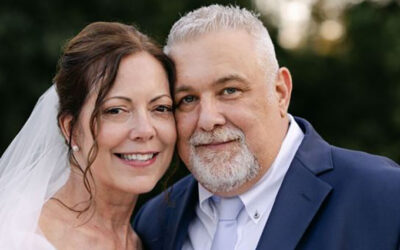Chase Ryals, CNMT, has been a nuclear medicine tech at St. Francis Health for about two years, and in that time he’s experienced encouragement and career growth he hadn’t imagined was possible.
“I’ve worked at other healthcare facilities in other cities, but since I’m from here I felt a calling to come back home,” Chase says. “I knew when I was going to come to St. Francis I was going to be challenged and it would allow me a lot of room to grow.”
achieving specialized certification
Chase has grown in his short time with our health system, achieving a specialized accreditation as a nuclear cardiology technologist, one of eight in the entire state. This means Chase is able to perform stress tests on behalf of physicians.
“Coming here I’ve grown and been challenged and matured,” he says. “I didn’t have the certifications that I have now. I’ve achieved more than I honestly thought I’d ever achieve in my entire career in these two years here.”
The initial appeal of nuclear medicine was only in part because of its high-tech name. “In nuclear medicine we focus more on the physiology rather than the anatomy. We’re able to study the function of an organ, and I think it’s fascinating,” Chase says. “Plus, I think it sounds pretty cool to say.”
first steps on a career journey
Chase comes from a healthcare family, so he was motivated to explore such career options.
“I enjoy helping people, and even if I can’t see the end result, just knowing that I placed a hand in that journey makes me thankful I’m in the position that I am,” Chase says. “I’m able to meet so many different people with different issues and place my hand in their life in some way.”
Chase is grateful that patients trust him, and the gratitude is often reciprocated. “It’s always nice to hear patients tell us how easy the experience was and how much we’ve helped them in their journey to healing,” he says.
pursuing excellence
Chase is inspired by his coworkers and his patients. His team provides a large variety of exams, which allows him to see a lot of faces and interact with many individuals.
“I want to be the best me that I can,” he says. “I know that coming to St. Francis I can truly better myself and not stay stagnant in the same position. I fully believe in the work they are doing here.”
The imaging department at St. Francis is top tier. “I have full confidence that when people come to our department, they are going to get the highest quality of care imaging,” Chase says. “What we’re doing here in nuclear medicine is something that hasn’t been available at St. Francis before. It’s a pretty special thing to have.”
be inspired and prioritized here
To someone considering a position with our health system, Chase is enthusiastic with his advice: “Absolutely take it. I would say to be prepared to better yourself. It’s going to result in making you a better person in the end. There’s a huge area for growth here.”
Chase knows he can rely on his leaders, and he appreciates being known as a trustworthy person himself. “I just know they have my back,” he says. “I know when I’m doing an exam that they trust me to do the correct exam and perform high-quality work.”
An important part of performing high-quality work is listening. “I believe listening is one of the most important aspects, because if you’re not listening, you’re not present,” Chase says. “If we’re not present with the patient, then it makes them feel like they aren’t valued.”
As a team member, Chase feels heard by his leaders. “My supervisors and directors always listen to me,” he says. “I feel like if we have a need, it is heard and they try to accommodate it as much as possible.”
future aspirations
Chase is interested in becoming even more proficient in imaging and hopes to extend his expertise more deeply in cardiology and cancer imaging. “I want to grow as an individual and as a technologist,” he says.
The health system will support him in achieving those goals through education assistance and flexibility to complete any future accreditations he may seek.
He also hopes to encourage others to follow in his footsteps to achieve the special nuclear cardiology certification. One of his colleagues took Chase under his wing, helping him study for the certification.
“We both have it now,” Chase says. “Now it’s my turn to help someone here.”




